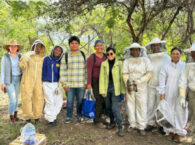Lowering Phosphorus Levels in Browntown
Metrics
Community
Green CountyCommunity Size
44,411University
University of Wisconsin - MadisonProgram
UniverCity YearCase Type
Project StoriesFocus Areas
EquityDiscipline
Civil Engineering, Enviormental EngineeringRegion
EPA Region 5, USAUniversity Department Code
EngineeringSustainable Development Goals
06 Clean Water and SanitationPopulation Type
Home OwnersThe WI DNR has changed legislation regarding phosphorus levels in municipal wastewater. The change, lowering standards from 4.8 mg/L to 0.075mg/L, created
noncompliance issues for the Browntown, WI municipal wastewater treatment facility. The
system operator, Rob, has emphasized that any changes to the system must comply with the
city’s public budget of $270,000 (for all divisions). Rob made a previous attempt to lower the
effluent phosphorus level to 1.0 mg/L, an intermediate level set by the WDNR. 0.75 gallons
alum over three days were applied at the start of this trial period and after failure to achieve
1mg/L, dosage was increase to 0.75 gallons each day, which still failed to reach target levels.
The goal of this project was to examine the chemical treatment trial for possible errors,
investigate alternative methods for lowering effluent phosphorus levels, and review WDNR
variances which could provide relief from the economic difficulty of achieving 0.075 mg/L
phosphorus in effluent wastewater.
Throughout the analysis of methods, the three paradigms of sustainability –
environmental, social and economic – were utilized to assess each method’s potential impact.
The scope of our project considers phosphorus level in the effluent the most important
environmental impact factor. High levels of phosphorous in effluent can cause eutrophication in
the receiving waters. The economic impact of each method was considered in the context of
potential excess cost that would fall on the public budget and down the line, the citizens of
Browntown. A new system may cut into Browntown’s already tight public budget, and again
could increase tensions in the community. These primary ideals were used to assess and analyze
the proposed solutions.
Read the final student report delivered to the local gov/community partner.
UniverCity Year Contact Info
Gavin Luter
Managing Director
gavin@cows.org
608-261-1141
University Faculty Contact
Andrea Hicks
Civil and Environmental Engineering
hicks5@wisc.edu
Local Government / Community Contact
Scott Anderson
Teacher at Juda School


